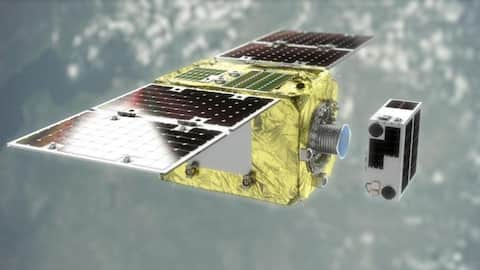This spacecraft can clean up space by removing dead satellites
What's the story
Japan-based Astroscale has come up with an interesting proposal to clear up space junk and orbital debris populating the low Earth orbit (LEO). Dubbed End of Life Services by Astroscale-Multiple (ELSA-M), the company's spacecraft is designed to capture and deorbit defunct satellites. The proposal is also touted to be efficient as the spacecraft will remove multiple dead satellites on every mission.
Context
Why does this story matter?
Space junk is becoming an increasing concern as companies like OneWeb and SpaceX are launching thousands of satellites to the LEO. These LEO satellites have definite lifespans and several of them are built to deorbit. These satellites that re-enter Earth's atmosphere burn up, solving the issue of their disposal. However, numerous satellites don't deorbit and add to the space junk.
Video
There are over 2,200 defunct satellites in space
In a video, Astroscale has detailed how space is becoming increasingly congested, with over 2,200 defunct satellites and over 630 cases of in-orbit collisions caused due to space debris. The clip further explains the cleaning process done by ESLA-M. First, the ESLA-M spacecraft will fly around and survey the decommissioned client satellite. After this inspection, it will align itself to dock with the satellite.
Process
ELSA-M can capture and deorbit several dead satellites every mission
After docking, ELSA-M will employ its thrusters to lower the defunct satellite's orbit toward a trajectory where it will disintegrate during re-entry through Earth's atmosphere. Having put the satellite on its appropriate path, the ELSA-M will detach and readjust its orbit to pick up the next target. On every mission, the spacecraft will be able to capture and deorbit several inoperable satellites.
Docking plate
Astroscale has also announced new-generation docking plate
For ELSA-M, Astroscale has unveiled its Generation 2 Docking Plate. This plate makes it easier for the spacecraft to capture defunct satellites that require de-orbiting and offers a "much-needed starting point for a variety of servicing options and a more responsible use of Earth's orbital resources" per the company. It has an on-orbit lifespan of more than 15 years.
Demonstration
ESLA-M's first demonstration will occur in 2024
ESLA-M's first demonstration is scheduled for 2024. During the trial, the spacecraft will dispose of a decommissioned OneWeb satellite which will have a docking plate to attach to ESLA-M. Astroscale aims to become the first company to demonstrate its multi-satellite deorbiting service for commercial purposes. The company receives a part of its funding from the European Space Agency (ESA) and the UK Space Agency.
